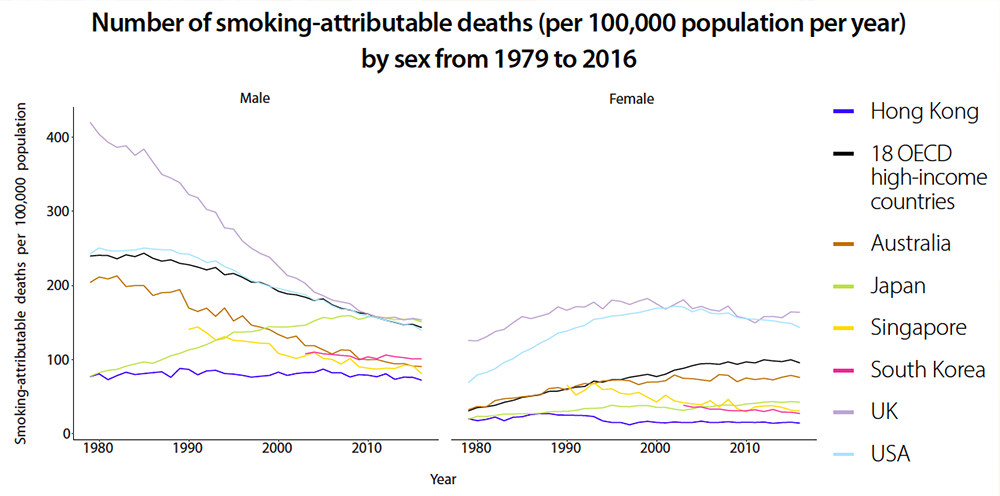November 2022 | Volume 24 No. 1
Living Long, Despite the Odds
Since 2013, life expectancy at birth in Hong Kong has been the highest in the world – 88.1 years for women and 82.7 years for men (as of 2020). And this has posed a conundrum for public health scientists and practitioners. Hong Kong has one of the highest income inequalities in the developed world, one of the highest population densities and its people work some of the longest hours. Hong Kong people also come 81st in the world when ranking their quality of life, according to a 2022 Gallup report. Plus, Hong Kong has kept its health expenditure as a fraction of gross domestic product at 5.9 per cent (lower than other high-income regions); its air quality is also not stellar. So why are people living so long?
It’s a question of interest not only locally but internationally, as a commentary in the US National Academy of Medicine in 2020 put it: “there could not be a more important puzzle to solve for the rest of the world.”
Now, a solution has been found through the work of Dr Michael Ni Yuxuan, Clinical Associate Professor in the School of Public Health and colleagues. Dr Ni conducted the largest and most comprehensive assessment of Hong Kong’s longevity to date, which has been published in The Lancet Public Health.
“Explanations for longevity in Hong Kong have included economic prosperity, our universal health coverage, and our very low maternal and infant mortality. But these things are true for many high-income regions, including in Asia. What really distinguishes us is that we have attained a low smoking prevalence for both men and women,” he said. “For the first time, we showed that successful tobacco control was the reason why Hong Kong’s life expectancy has surpassed all other populations.”

Dr Ni (right) organised the 7th Public Health Forum at the School of Public Health on the Major Health Challenges of the 21st Century, where he also presented findings on the evolution of population mental health in Hong Kong over the past decade.
Vigilance still needed
Using life expectancy data from 18 high-income countries from 1960 to 2020 and mortality data for 263 million deaths, they demonstrated that Hong Kong had the lowest mortality for cardiovascular diseases among high-income regions and one of the lowest mortalities for cancer in women – both of which are linked to smoking.
Only about 10 per cent of Hong Kong people smoke, versus 28 per cent in France, 20 per cent in South Korea and 16 per cent each in the UK and US. In China 42 per cent of men smoke. On average, smokers die 10 years younger than non-smokers.
For Dr Ni, the results show that there is a continued need for vigilance against tobacco around the world (see also Snuffing out Alternative Tobacco Products).
But he cautioned Hongkongers against being too celebratory about the achievement just yet. “A caveat to this whole story is that although we have ranked first in the world in longevity for the past eight years, a global survey has shown that mental well-being in Hong Kong was among the worst. We have a very long life expectancy, but on average it may not be a very prosperous, fulfilling and happy life,” he said.

Mental health remains a concern
Dr Ni’s team has been studying this aspect of health, too. Using the FAMILY Cohort of 46,000 participants, they have conducted multiple surveys on physical, mental and social well-being in Hong Kong – the key domains of health as defined by the World Health Organization (life expectancy being only one measure of health). The FAMILY Cohort serves as a health and well-being barometer for Hong Kong, having tracked the evolution of physical, mental, and social well-being with more than 20 longitudinal follow-ups since 2008.
Notably, the FAMILY Cohort has shown that while Hong Kong had the lowest levels of depression in 2011–2014, these have risen significantly since and have not dropped back to the baseline. High levels of depression and anxiety were recorded during the fifth pandemic wave this spring, when Hong Kong had the highest daily COVID-19 mortality rate in the world.
Dr Ni believes mental well-being should be a factor guiding health policies during and after COVID-19 since mental health disorders are the leading cause of disability in the world and affect one in four people.
“There is evidence that actions to address inequalities, poverty, and urban systems, and taking a lifelong course approach to mental health from birth are important. We’ve found that among all the determinants of mental health, some of the most important are the social determinants,” he said.
“The next phase is to look at how we can prevent the onset of mental health disorders because they are so chronic and disabling, and how to improve the mental health of populations.”
We have a very long life expectancy, but on average it may not be a very prosperous, fulfilling and happy life.

DR MICHAEL NI YUXUAN

